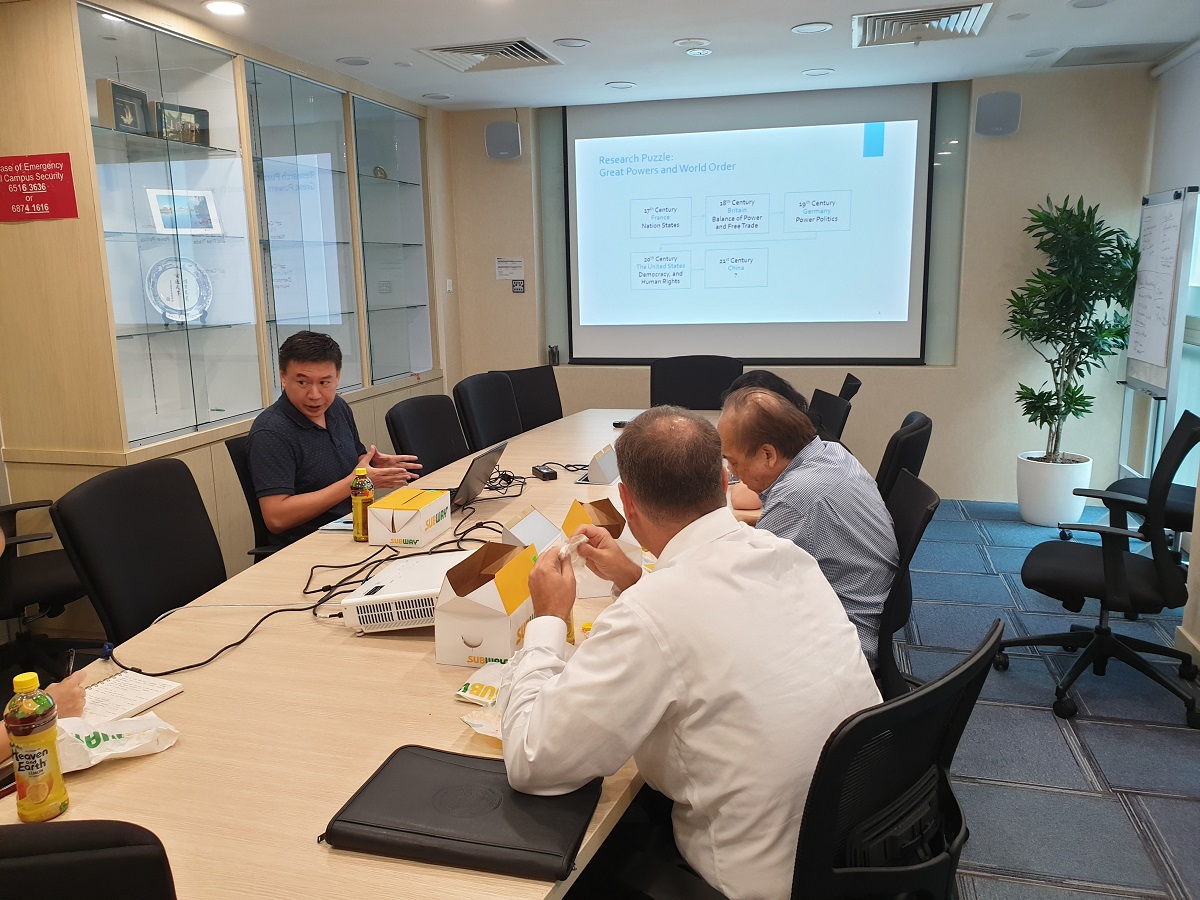
Dr. Li Hak-yin, a Visiting Fellow at East Asian Institute, presented on the 19th Politics and IR Brown Bag Session on the topic of A Norm-Maker or A Hypocritical Rising Power? The Study of China’s Two Policy Faces. Different countries can have different foreign policies at different phases of time, but it is also very common to have a country to say one thing and do the other. In the past few centuries, when a great power rises, that power has some values that it seeks to implement. For example, when France rose as a great power, it valued the importance of nation states, while the US valued human rights and democracy after WWII. Hence the question is, as China rises, what would its values be?
While it is believed that through its values, we will be able to see if China seeks to integrate itself into the extant world system or if it is seeking to construct a separate, Sino-centric Asian order from which to eventually challenge the West. This is because the norms and values that a great power subscribes to will be reflected in its military and economic policies. However, the foreign policies of China have not been consistent in different times and spaces. This has made people wonder if China has hidden agendas behind its foreign policies, or if China is just fine-tuning its policies over time. The most important question is, whether China is a norm-maker or a “hypocritical rising power” that is just waiting for the right time to take actions that suit its own agendas? It is pointed out that over the past few decades, China’s foreign policy principles have been “revolutionary” for anti-imperialistic and anti-power politics. However, when taken a closer look, there are many discrepancies between China’s pronounced principles and its actual actions. For example, while China insists on non-intervention policy, but recently China has soft-intervened into the affairs of other countries such as North Korea. Also, China claims that its military policy is defensive in nature, but its forces are behaving more assertively now.
Usually, the discrepancies of foreign policies are caused by three factors, namely national interests, lack of capability, and overestimation. By national interests, it means that the power suddenly finds a particular action over a certain issue will suit its national interest, therefore it acted differently as it proclaimed in the past over the same issue. The lack of capability refers to the inability of the power to impose its will and values onto other countries; while overestimation refers to the gap between its achievable actions and what it proclaimed in the past. These three causes of discrepancies can also be used to explain the actions of China and its proclaimed foreign policy principles. On the one hand, there are arguments that China is a norm-maker in the sense that it has insisted on anti-power politics principles. On the other hand, there is also an argument that China is a hypocritical rising power since it is believed that China would act just like the US when it is strong enough. However, there is a synthesis, which is, China is trying to strike a balance between the both and is attempting to be a self-constrained rising power, in which China wants to be a great power but also wants differentiate itself from the US. China has been able to maintain a degree of ambiguity and flexibility in its values and principles, which provided leeway for its actions overseas.
During the Q&A, a question has been asked on the definitions of the terms “hypocritical rising power” and “self-constrained rising power”. It has been pointed out that perhaps “contradictory” is a better word than “hypocritical.” Also, China needs to be both a norm-maker and norm-taker to be a rising power. Perhaps a better research question would be what kind of new world order would China usher in, but the problem with such a research is that, when one tries to predict the future from current behaviors, but such predictions have not been very accurate. Dr. Li replied that by “hypocritical” it usually refers to the hidden agendas of a nation, which can be reflected through its actions. While China has been a norm-taker in the past couple of decades, but it is important to know if China will continue to be a norm-taker or will emerge as a norm-maker.